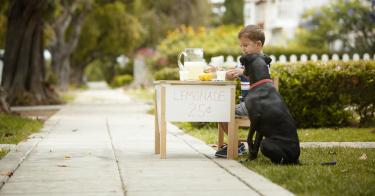It’s hard to find fault with a kids’ lemonade stand. In fact, I can’t help but smile when I see one.
But in some places, it is literally a crime to operate a lemonade stand on your own property unless you’ve first gotten all the required government licenses and permits. Same thing if you’re thinking about selling hot chocolate or any other beverage.
In fact, about a mile up the road from my home, Montgomery County authorities shut down a lemonade stand in a front yard because the kids were operating without a permit. Officials slapped their family with a $500 fine. So much for the kids’ plan to donate 50 percent of their profits to a pediatric cancer charity.
After a public outcry over this action, county officials dropped the charges and the fine. But the law criminalizing unlicensed lemonade stands hasn’t changed.
Maryland’s health code makes it a crime to operate a “food establishment” (which includes a lemonade stand) that does not comply with the state’s licensing requirements. The first offense is punishable by a fine of up to $1,000 and 90 days in prison. A second offense carries up to a $2,500 fine and one-year imprisonment.
In addition to these criminal penalties (which typically fall on the parents of children operating unlicensed lemonade stands), the children themselves are liable for up to $5,000 in civil penalties.
So what would kids and parents need to do to operate a legal lemonade stand? It’s not entirely clear, but in Montgomery County, it could require obtaining as many as six licenses and permits:
1. A sidewalk vendor license;
2. A site-specific vendors license;
3. A limited duration sign permit;
4. An awning or canopy permit;
5. A mobile food service unit license; and
6. A special food service facility license for temporary events.
What 6- or 10-year-old has the wherewithal to do all that? And what parent is going to go through all that hassle just so their kids can have fun and make a buck?
Putting kids’ lemonade stands out of business isn’t the same as ending a person’s livelihood, but it’s nonetheless disturbing and lamentable.
Operating a lemonade stand teaches kids all sorts of valuable life lessons. For starters, they have to work together, divvying up jobs of making the sign, setting up the table, making the lemonade and obtaining the cups.
Then there are the economics and math lessons involved in pricing the lemonade and making change for customers.
And attracting and interacting with customers can help build kids’ interpersonal skills. I know my more reserved children have learned a thing or two from watching their more outgoing siblings actively recruit customers and strike up conversations with neighbors.
In fact, running a lemonade stand is such a well-established and well-regarded rite of passage, it’s even integrated in childhood development curriculums. Among my kids’ after-school activity programs is a “My First Lemonade Stand” course, which aims to “empower kids with an entrepreneurial mindset” while introducing them to the disciplines of finance, strategy and marketing.
Fortunately, the Maryland legislature is considering bipartisan legislation that would bar localities from adopting or enforcing regulations on the sale of lemonade and other nonalcoholic beverages by minors on private property.
With Maryland’s new slogan and welcome signs touting “We’re Open for Business,” it’s time to stop criminalizing children’s lemonade stands and let them enjoy this common childhood pastime while learning a thing or two about business.
This piece originally appeared in The Washington Post



